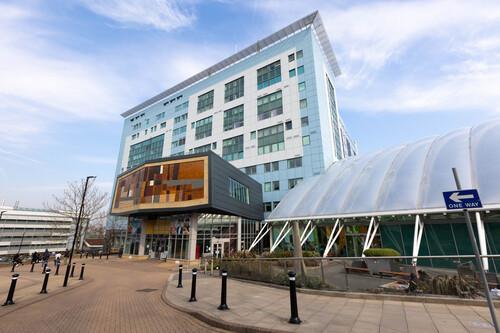University part of first research on Net Zero in higher education

THE UNIVERSITY of Bradford has taken part in a first of its kind report looking at how to reduce the carbon footprint in higher and further education.
The report, Accelerating towards Net Zero, highlights target areas where universities and colleges can report and reduce their emissions as well as proposing a new standardised framework designed exclusively for the sector to measure, report and manage carbon emissions.
The research project was launched last March by the Royal Anniversary Trust, involving 21 UK universities and colleges - The Platinum Jubilee Challenge group - all of whom are recent winners of the prestigious Queen’s Anniversary Prize.
Kristina Murrin, CEO of The Royal Anniversary Trust said: "Our ambition was to bring together the extraordinary winners of the Queen’s Anniversary Prizes to collectively tackle a tough shared challenge. The resulting report sets out a clear action plan for the tertiary education sector to accelerate progress to Net Zero, with recommendations for institutions and government. We are enormously proud of the proposed carbon reporting Framework – if adopted sector-wide, this will allow for consistent, transparent, and data-led decision making."
The University of Bradford has been taking "steady steps" towards reducing its carbon footprint, including installing solar panels and heat pumps, as well as replacing old gas boiler fired heating systems.
Stuart McKinnon-Evans, Sustainability Programme Sponsor, said: "The University of Bradford is taking firm and steady steps towards becoming more sustainable and carefully planning its ultimate goal of achieving net zero carbon emissions. We welcome this report and echo the recommendations made therein, and we urge the Government to support us in our endeavours. Nobody should underestimate the complexity and necessity of emissions reduction.
“We have done a great deal of work to ensure sustainability is at the very heart of all we do, from signing the UN’s Sustainable Development Goals, and attending COP27 in Glasgow and being awarded permanent observer status, to carrying out numerous decarbonisation projects across campus. Our students are also keenly involved through the student-led Sustainability Society."

Pictured above: Stuart McKinnon-Evans
Last year, the University secured £3.3 million in Government funding order to assist the University in delivering Low Carbon Heating and other Decarbonisation works on campus. The Projects include:
- Decarbonisation of the Richmond Building and Richmond Workshop Building Domestic Hot Water Services.
- Decarbonisation and energy saving relating to replacement of ventilation in the ICT building.
- Decarbonisation of heat generating equipment in the Unique Sports Centre, Post Graduate Lounge and the Faith Centre.
- Installation of Solar PV to the Ashfield, Sports Centre, Faith Centre, Post Graduate Lounge, Horton D and Horton A buildings.
- Building Fabric Upgrades to the Unique Sports Centre, Faith centre and Post Graduate Lounge, Including roof insulation, cavity wall insulation and new windows.
- Installation of heat meters across the campus.
- Installation of new LED lighting to the library.
Mr McKinnon-Evans added that he is confident the University will continue to secure more external funds to finance the transition to net zero.
The Accelerating to Net Zero report found:
19% of the sector’s total emissions are related to the Built Environment, including construction, fuel and electricity.
24% of the emissions were from travel and transport
36% of the total emissions relate to supply chain emissions, which are influenced by specialised purchases such as medical equipment and business services.
The report also includes 14 recommendations to Government, including establishing a UK-wide Decarbonisation Institute for the tertiary education sector, funding the research and development of a simple digital business travel management tool and portal to track, measure and influence staff and students’ business travel and creating a sector-led digital ‘hub’ to share resource materials to accelerate knowledge for those responsible for creating and implementing Carbon Action Plans and Net Zero strategies.
Background information
Under the Sustainability and Climate Change Strategy, the Department for Education has committed to enable all further and higher education settings to report their emissions via a standardised and comparable framework by 2024.
The Standardised Carbon Emissions Framework proposed in the report was developed by EAUC, the Alliance for Sustainability Leadership in Education and funded by the Department for Education.
The Royal Anniversary Trust was established in 1990 to create a national programme of celebrations marking the 40th anniversary of The Queen’s accession in 1992. It runs the Queen’s Anniversary Prizes – the highest national honour awarded in UK further and higher education, with Prizes granted every two years. A total of 296 Prizes have been awarded to 83 universities and 54 colleges of further education over 14 Rounds, for work that shows outstanding quality and innovation and delivers real benefit to the wider world.
